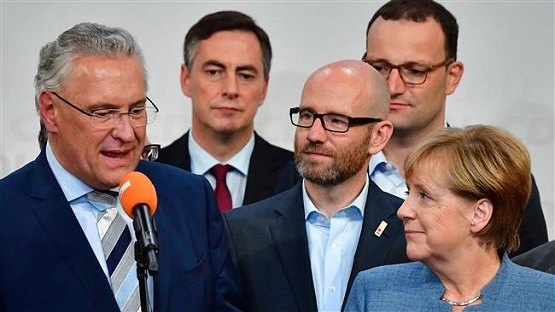Fresh from elections that gave her a fourth mandate as Germany’s chancellor, Angela Merkel will now be starting a quest for political partners, a task she is likely to find more difficult than in the past in the wake of a surge in support for a far-right party.
Merkel’s conservative Christian Democratic Union (CDU/CSU) bloc took 33 percent of the votes in elections on Sunday. The Social Democratic Party of Germany came second with 20.5 percent, and the hard-line Alternative for Germany (AfD) took 12.6 percent of the votes.
Some German media outlets described the showing by Merkel’s party — whose votes were down by 8.5 points from the 2013 elections and lowest since 1949 — as a political “nightmare” for the German chancellor.
Racists at the Bundestag?
This is the first time a far-right party has entered the German parliament, known as the Bundestag, in more than half a century. The entry of dozens of hard-right lawmakers to the German parliament marks a break in the general tendency against nationalism in post-World War II Germany.
Alexander Gauland, a leading AfD politician, has vowed to expel foreign refugees and restore the country as a purely German one.

The difficulty of being Merkel
Merkel’s party is still the biggest parliamentary bloc, and Europe’s most powerful leader has said that her conservative allies would start building the next government and that she was sure a coalition would be agreed by Christmas.
“There cannot be a coalition government built against us,” she has said.
However, a weaker Merkel at the head of a potentially unstable coalition with the 10.7 percent pro-business Free Democrats (FDP) and 8.9 percent Greens, untested at the national level, has unsettled investors.
The euro slipped in early Asian trading on Monday trading, down 0.2 percent at $1.1930, with the prospect looming of months of uncertainty in Europe’s biggest economy.
“Earthquake, warning, landslide, shock. This election can only be described with such drastic vocabulary. It was an anti-Merkel election that ended as a pro-Merkel election,” said Germany’s Handelsblatt business daily.
Some business leaders were alarmed, saying the AfD, which has been likened by the German foreign minister to Nazis — could hurt Germany.
“The AfD in the German Bundestag is damaging our country,” employers’ association BDA leader Ingo Kramer said. “The other parties now have the task of cornering the AfD in direct parliamentary debate.”
Gauland gave the public an idea of what was to come, vowing to “hound” Merkel and “get our country and our people back.”
‘Move fast on economy!’
The SPD, which has been partner to Merkel’s conservative bloc in previous administrations, announced after the vote that it would go into the opposition after slumping to a post-war low of 20.5 percent.
Merkel’s main option is to pursue a three-way partnership.
The prospect of Merkel sharing power with smaller parties, the right-wing FDP in particular, is likely to cause problems for Europe’s biggest economy and its European Union allies, especially France.
Nonetheless, Merkel’s inner circle will prepare for what could be lengthy coalition talks ahead with a number of smaller parties.
A “Jamaica” alliance of her conservative bloc, the FDP, on 10.7 percent, and the Greens, on 8.9 percent, could be fragile due to fundamental differences on issues from migrants to taxes, to the environment and to Europe policy.
Industry leaders have urged Merkel to move fast to secure the economy against problems arising from political division in the German Bundestag.
“Now it’s all about averting damage to Germany as a place of business,” Dieter Kempf, the president of the BDI industry association, said.
LINK: https://www.ansarpress.com/english/8871
TAGS:































 online news tv
online news tv




